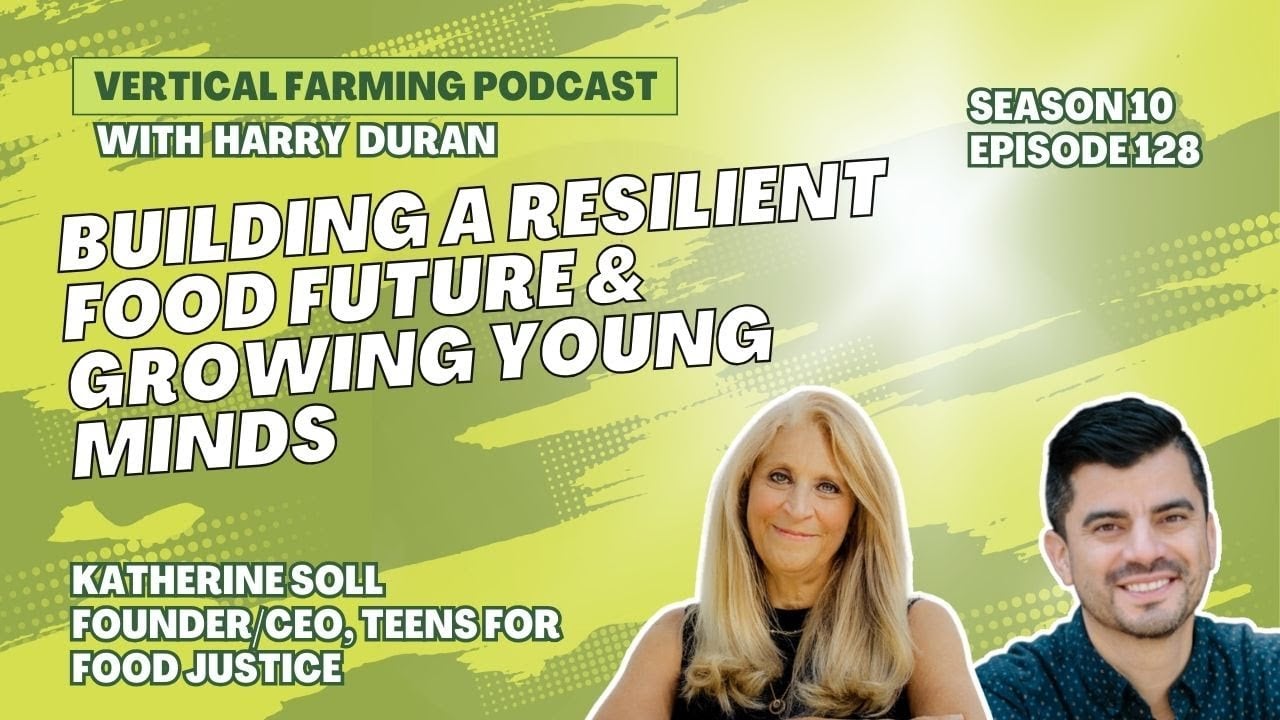Key Takeaways:
- Katherine Soll founded Teens for Food Justice (TFFJ) to empower students to tackle food insecurity through urban farming and hydroponics.
- The program operates seven farms in New York City and one in Denver, with plans to expand to 10 farms by 2025.
- TFFJ integrates hydroponics into STEM, advocacy, and nutrition education, offering students practical farming experience and leadership development.
- The organization emphasizes community-wide engagement, with school campuses collectively sharing farm produce.
- Soll calls on the vertical farming industry to invest in youth education as a workforce pipeline for the future.
Katherine Soll on the Origins of Teens for Food Justice
Katherine Soll, founder and CEO of Teens for Food Justice, joined the Vertical Farming Podcast to share the journey behind the organization’s creation and growth. Based in New York City, Soll launched the initiative to tackle food insecurity while providing students hands-on education in hydroponic farming.
“The idea was to engage young people in meaningful service while giving them a platform to address food justice in their own communities,” said Katherine Soll.
What began as a volunteer-based pilot quickly expanded into a citywide initiative. TFFJ now operates hydroponic farms in public schools, producing thousands of pounds of fresh produce annually while delivering STEM-aligned education to students.
Why Katherine Soll Focused on Hydroponics and Urban Impact
An Urban Solution Rooted in Justice
Katherine Soll noted that hydroponics offered an efficient, scalable, and curriculum-friendly solution for school environments in dense urban areas like New York.
“We really focused on what could be done in an urban setting, and hydroponic vertical farming proved to be a powerful model—both for food production and education,” said Soll.
Students participating in TFFJ’s programs gain experience in agriculture, engineering, and advocacy, with exposure to everything from aeroponics to aquaponics, while understanding the systemic causes of food inequality.
Katherine Soll on Organizational Growth and Student Engagement
Expansion Beyond New York
Since founding Teens for Food Justice over a decade ago, Katherine Soll has overseen the expansion from a single school-based farm to a growing network spanning five New York City boroughs and a site in Denver. By the end of 2025, TFFJ aims to operate 10 school-based farms.
TFFJ currently employs 16 full-time staff and supports dozens of student interns. The initiative is built on inclusivity: each school shares access to the farm’s produce and programming, regardless of which students directly manage the systems.
“It’s not the school’s farm, it’s the campus farm,” said Soll. “Everyone has a role in growing food and making it available to the entire community.”
Katherine Soll on Leadership, Resilience, and Funding Challenges
Learning to Let Go While Staying True to the Mission
Reflecting on her leadership evolution, Katherine Soll emphasized the importance of collaboration, adaptability, and trust in team members. Having taken over her family’s business in her twenties, she learned early the value of resilience, ownership, and vulnerability.
“Letting go has been essential,” said Katherine Soll. “Our culture is built to empower others, and now it’s strong enough to grow without me directing every step.”
She acknowledged the ongoing challenge of mission alignment, particularly when deciding whether or not to accept new funding.
“You’re constantly asking: is this grant or opportunity helping us fulfill our core mission, or is it taking us off course?” she said.
Katherine Soll on Future Collaboration with the Vertical Farming Industry
A Call to Invest in the Next Generation
Katherine Soll encouraged leaders in the vertical farming industry to connect more directly with youth-focused programs like TFFJ. She believes these connections will build a more inclusive and prepared future workforce.
“Our students are growing food in machines inside their schools—they’re fascinated by it,” said Soll. “They’re excited, engaged, and ready to be part of this movement. But the industry needs to step up and invest in education.”
She called on companies to offer internships, mentorships, and tours to help students envision career pathways in CEA (Controlled Environment Agriculture).


